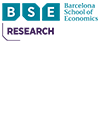Researchers in the Barcelona GSE community have written several widely-read articles on CEPR’s policy portals, VoxEU and VoxDev. In case you missed them, here is a roundup of articles from April-June 2020.
Articles are listed in chronological order starting with the most recent. Work previously featured on the Barcelona GSE Voice is not included.
Competition and the welfare gains from transportation infrastructure in India
Jose Asturias (Georgetown SFS-Qatar) and Manuel García-Santana (UPF and BSE)
The construction of the Golden Quadrilateral has seen unequal gains in manufacturing income across states, largely due to proximity to the highway.
Democratic tipping points
Antonio Ciccone (ICREA-UPF and BSE) and Adilzhan Ismailov (PhD Candidate, GPEFM)
Persistence of democratisation following transitory economic shocks plays an important role in the theory of political institutions. This column tests the theory of democratic tipping points using rainfall shocks in the world’s most agricultural countries since 1946. Negative rainfall shocks have a strong and transitory effect on agricultural output, but a persistent positive effect on the probability of democratisation even after ten years. These findings suggest that even if it were short-lived, the COVID-19 crisis is likely to tip the scales against some authoritarian regimes and lead to persistent democratisation.
The rise of extreme politics in a federation
Gianmarco Daniele (Bocconi), Amedeo Piolatto (UAB and BSE), Willem Sas (Stirling)
Polarisation, populism, and extremism are on the rise on both sides of the Atlantic. This column focuses on the role of policies in multi-level federations (such as the EU) in partially explaining the rise of extreme political parties. An analysis of differences in vote shares between European and national parliamentary elections suggests that support for extreme politicians is highest in countries with the largest gains and losses from federal policies. Eurosceptic parties, which are very protective of national interests, win higher shares of the EU vote in core and periphery countries, whilst the opposite is true for countries in the middle.
The EU recovery fund: An opportunity for change
Massimo Motta (ICREA-UPF and BSE) and Martin Peitz (Mannheim)
The European Commission has been asked to develop a proposal for a new recovery fund of more than €1 trillion. Given the substantial support needed by most sectors in the present circumstances, it is crucial to identify the ones which are most important to proper functioning of the EU economies. Based on the principle of subsidiarity, this column formulates two general criteria to identify these sectors: those for which (i) the volume of cross-border trade within the EU is large, or (ii) externalities across member states are important. Support schemes should be oriented towards the future and not try to preserve the status quo ante.
Bank portfolio risk profiles vs the zero lower bound
Johannes Bubeck (Deutsche Bundesbank), Angela Maddaloni (ECB), José-Luis Peydró (ICREA-UPF and BSE)
The way that banks in the euro area react to negative central bank interest rates may be closely linked to their individual funding structure. This column suggests that they do not generally pass negative rates on to their depositors, and that they search for yield by investing in riskier securities. New evidence suggests that their investments are directed more towards securities issued by the private sector and securities denominated in dollars.
Repair and reconstruct: A Recovery Initiative
Ramon Marimon (EUI, UPF and BSE) et al.
The EU has been slow to formulate its response to the Covid crisis. Fortunately, things have started to change. The EU’s leaders should finish work on the new borrowing facilities, first by clarifying the maturities of the borrowings, and second by being prepared to beef up their amounts if needed. It is also crucial to find ways to jointly finance priority action and to provide support to countries worst affected by the crisis in order to restart their own economies. The objective of a Recovery Initiative should be to repair and reconstruct the EU economy: to repair corporate balance sheets and value chains; and to reconstruct the economy on a new, sustainable basis through investment in common public goods such as research, resilience, and the greening of the economy. This will involve targeted investment, coordinated restructuring in some sectors, and the introduction of an equity fund to help SMEs survive the crisis.
Tax evasion in the real estate sector: Using appraisals as a red flag
José García-Montalvo (ICREA-UPF and BSE), Amedeo Piolatto (UAB and BSE), Josep Raya (UPF)
Tax evasion is a persisting problem across countries, with fraudulent behaviour especially common in the real estate sector. This column argues that tax authorities should use appraisals to identify potentially fraudulent real estate transactions. Transactions with an appraisal value that is low compared to the sales value are shown to have a higher likelihood of involving fraud. This is because low appraisals indicate an unconstrained buyer who, in contrast to a liquidity constrained buyer, is able to afford an (illegal) side payment to lower the sales value and thus the tax payment without resorting to a high mortgage.
Conflict and development
Joan-Maria Esteban (IAE-CSIC and BSE) and Debraj Ray (NYU)
In this VoxDEV video, Debraj Ray and Joan Esteban discuss the need to understand the drivers of conflicts to design the best institutions to cope with them.
Have a safe, healthy, and relaxing summer!
Barcelona GSE Focus will return in September with new articles and research.

